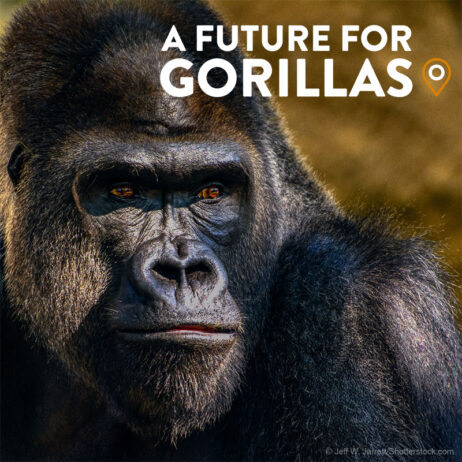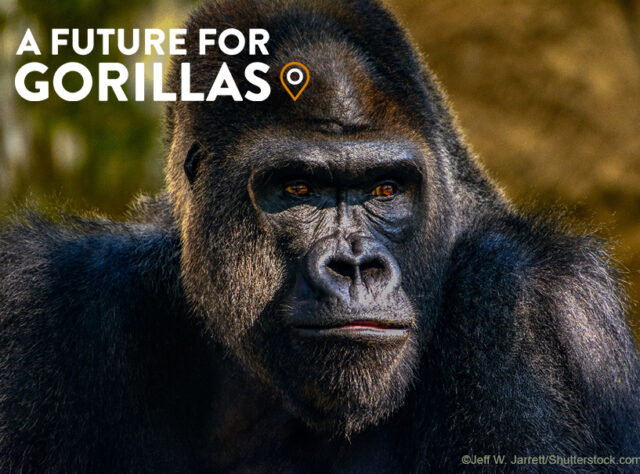
Donating to our new appeal will ensure that the 300 or so Western Lowland Gorilla living at Deng Deng National Park have protected land to travel through, preventing the extensive genetic decline rangers fear would otherwise take place. Image credit: Jeff W Jarrett/Shutterstock.com
Cameroon’s Western Lowland Gorillas and Chimpanzees are amongst our closest relatives in the wild and yet their home is shrinking as logging and poaching surges. Donations to our new campaign will avert long-term catastrophe by supporting a new forest corridor, forever connecting great apes to a future safe from threats.
It may be years since Louis Nkembi ran into a troop of 15 Western Lowland Gorillas out in Cameroon’s rainforests, but he has not forgotten:
“I was on a field trip in 2018 when we met a group of them,” remembers Nkembi, founder and CEO of Environmental and Rural Development Foundation (ERuDeF), a partner of World Land Trust (WLT). “It was so exciting because we’d finally discovered their location – we’d finally managed to see them, moving across the forest in the early hours of the day.”
Nkembi’s words encapsulate the wonder that is to share the Earth with the Gorilla, Chimpanzee, Pangolin, Hippopotamus, Leopard, African Clawless Otter and others; the many threatened species you can now support through our newly-launched £100,000 #FutureForGorillas appeal.
Cameroon’s Gorilla and Chimpanzee are very much like us, relatives so close they share 96-98% of their DNA with humans. However, as our population booms and spills into every corner of the planet, theirs is fading away – a shrinking and dwindling of their rainforest home that takes place as great apes can only look on.
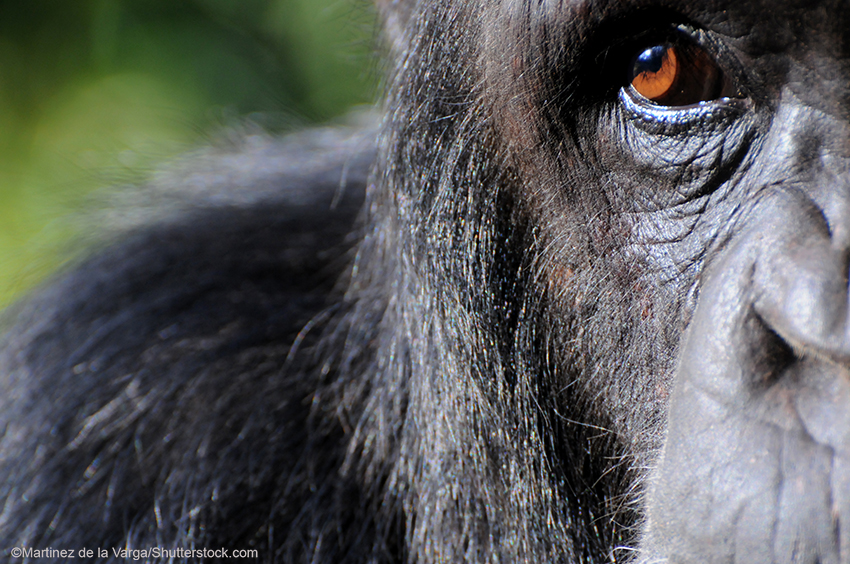
At 96%-plus of shared DNA, great apes’ genetic similarities with humans make them our closest relatives in the wild but also vulnerable to pandemics such as Ebola and COVID-19. Image credit: Martinez de la Varga/Shutterstock.com
The Critically Endangered Western Lowland Gorilla are predicted to lose 80% of their global numbers over the next 66 years. For the 300 or so living in the Deng Deng National Park of east Cameroon, the future looks sombre as recent world events deliver yet more disruption, including a sharp rise of poaching and logging all around the park as refugees arrive from Cameroon and abroad.
If conservation action does not come, Deng Deng’s Western Lowland Gorilla, the most northerly known population of this species, will eventually be trapped within the National Park’s limits. Slow decline and eventual loss of this iconic species through decades of inbreeding is a real risk but also one you can fully prevent by acting now to support ERuDeF’s plan – a vision for a new corridor, a new future for great apes.
A conservation bridge to a safer tomorrow
With help from your donations, ERuDeF’s plan will give great apes a safer tomorrow by tapping into one of nature’s greatest allies: connectivity.
Our partner will use the funds from the appeal to protect 23,692 acres (9,588 hectares) of land across a first (12,355 acres or 5,000 ha) and second (11,337 acres and 4,588 ha) community reserves. These two sites (see map below) will be a conservation bridge for Deng Deng’s wildlife to safely travel south to the Belabo Council Forest, and reach their peers across the broader Congo Basin.
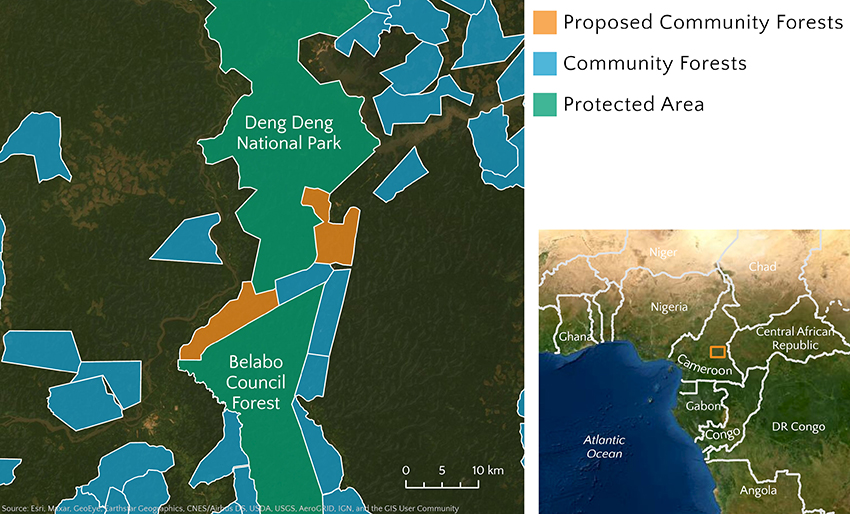
The community reserves will benefit great apes, elephants, hippopotamus, leopards, pangolins, endangered birds but also the people living nearby, with plans by ERuDeF to invest in schools and alternative livelihoods. Image credit: World Land Trust.
In conversation in August 2020, ERuDeF CEO Louis Nkembi and project manager Gwendoline Angwa were enthusiastic as they pointed at the astounding array of biodiversity that will be connected to a better future via the two proposed community reserves – a conservation bridge of dense tropical and subtropical moist broadleaf forests.
Deng Deng’s 300 Western Lowland Gorilla aside, the forest corridor will give a new chance to the park’s estimated 400-600 Chimpanzee; the area’s African Forest Elephant, Hippopotamus and Leopard; two Pangolin species (Giant Ground and White-bellied), two Otter species (African and Congo Clawless Otter) and two globally threatened bird species: the Grey Parrot, and Grey-necked Rockfowl.
The jaw-dropping list, just a selection of Deng Deng’s residents, showcases the urgency of protecting the corridor before the human hand transforms it for good. “We’re witnessing the arrival of new communities and we’re looking several decades into the future,” says Louis Nkembi. “If we have no conservation bridge and this human pressure continues, this abundance of gorillas, elephants and others will be decimated through inbreeding.”
Connecting Cameroon’s forests to save the bond of people and planet
At stake in Cameroon’s rainforests is the future of one of our deepest connections in the wild.
Asked about the relationship between great apes and humans, Louis Nkembi points at the belief among certain Cameroonian communities of a totemic link with the Gorilla – an association that sees people channel these great apes as they venture deep into the forest to harvest medicinal herbs.
United by that bond, humans and great apes are feeling the bite of today’s reality of environmental breakdown. Climate change and other threats unleashed by humans are hitting both groups, as are the pandemics driven by wildlife trafficking: great apes’ near-human DNA puts them at risk of contracting COVID-19, adding to the Ebola epidemics that decimated an estimated third of Western Lowland Gorilla populations in the early 2000s.
At ERuDeF they know both ends of the human-animal bond will need to be taken care of if conservation is to win the day. With help from your donations, our partner’s approach – community reserves – will extend a helping hand to the people already present in a historically deprived area of Cameroon, as well as the refugees forced to seek shelter here.
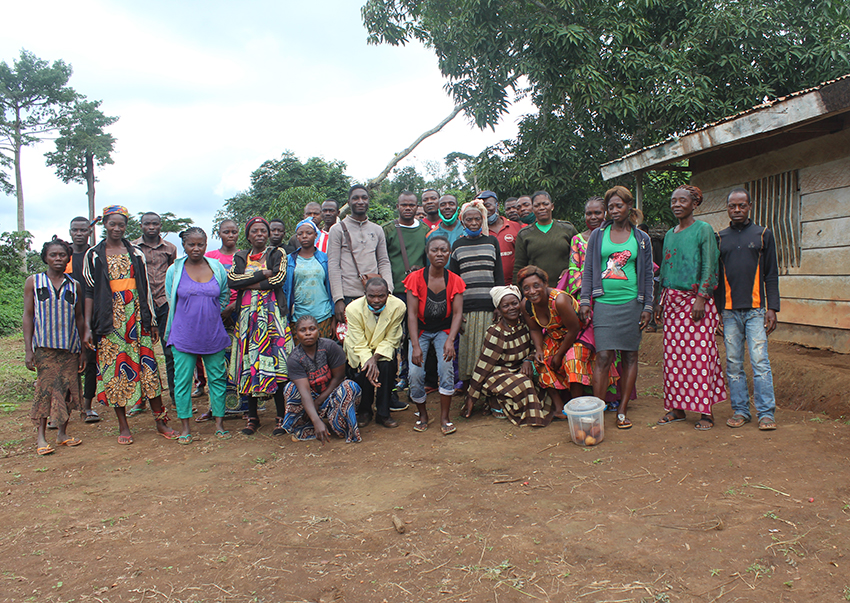
WLT partner ERuDeF has already approached communities near Deng Deng to showcase the benefits the corridor will bring to people and planet both, with assemblies (see picture) held across various villages in July. Image credit: ERuDeF.
ERuDeF wants to ensure alternatives exist to bushmeat hunting and will offer each ethnic group strategies that best adapt to their needs, from beekeeping to the rearing of pig and poultry. But our partner is thinking bigger than day-to-day survival: as project manager Gwendoline explains, the corridor project will seek to improve lives in the long run by supporting local schools and laying the foundations of a healthier economy.
In a year like 2020, people and planet stand more united than ever in their common plight. If humans have felt this year the distance with those we love, Deng Deng’s Gorillas face a similar fate as they risk becoming forever cut off – isolation followed by the irreversible erasure from history.
By donating to #FutureForGorillas, you can make sure the story doesn’t end like this; you can reconnect both ends of the age-old bond – humankind and their great ape relatives – to a safer tomorrow. “This corridor project is particularly important for so many reasons,” concludes Louis Nkembi of ERuDeF, adding: “I’m so excited to be part of conservation work like this in Cameroon – it means we can all leave behind a legacy.”
